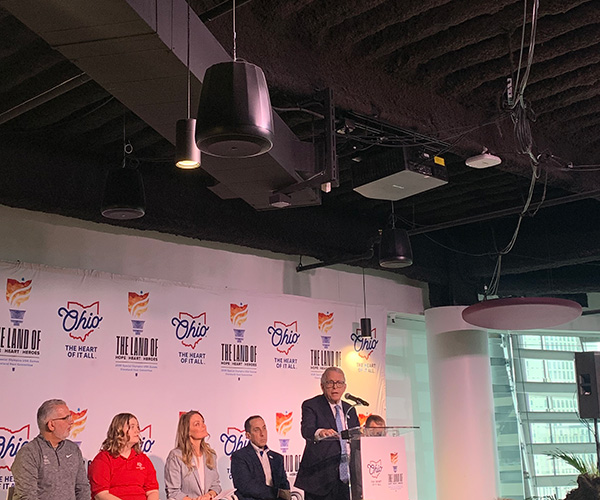|
|
On Nov. 1, 2001, that statement will apply to John Hart. The Indians' general manager since 1991, an emotional Hart announced on April 5, 2001 — the day after the Indians' streak of 455 straight home-game sellouts ended — he will step down from his post after the Tribe's 101st campaign.
Hart, the subject of Cleveland Magazine's April 2001 cover story, was instrumental in breathing life into a floundering franchise. The Indians won five American League Central Division championships and went to two World Series under Hart's tutelage. "When I first came to this club, [the Indians] were a franchise that had very little respect [around the league]," Hart said. "Now, the Indians are a model for baseball."
Hart will remain with the club as senior advisor of baseball operations after relinquishing his position to assistant general manager Mark Shapiro. Hart will assist Shapiro and owner Larry Dolan with team development "and anything else they deem appropriate," Hart said."The last chapter hasn't been written," Hart said.
In the April issue of Cleveland Magazine, John Hart talks about the trials of being the Cleveland Indians general manager. Here, he discusses a chapter in baseball history that Cleveland fans will not forget — the 1994 work stoppage — and the possibilities of a players' strike after the 2001 season.
Q: Now there is, of course, a chance there will be a work stoppage after 2001. Will you be surprised if there is and what do you think it will do to the game if anything?
A: That's a great question.
As a general manager, I think everyone in the game realizes there needs to be changes made. We need to have a system that works better. The money's gotten obscene. Although I want players to be paid well, it's obscene. Right now in the baseball industry, a maverick owner can come in and do something — [make a] big splash — and everybody else has to follow along. [I think that] at the end of the day whatever decisions are made with labor should be done between the baseball commissioners office and the union. At the end of the day, people don't need to hear general managers and ancillary people saying anything about it.
As a fan, though, my response is, "Please no. We don't want to see that happen. The game stands on its merits as the absolute most beautiful game of all time. It's timeless. There's no shot clock. It's a lazy Sunday afternoon that just passes its way through. It's a summer night under the lights. [A work stoppage] can't happen. It shouldn't happen. It's too special of a game."
I don't want it to happen as a fan, but as a general manager, we need to make changes. So I don't know what's going to happen.
But please write that general managers shouldn't be shooting their mouths off and saying anything about labor. I think it's time that everybody other than the commissioner and his appointees and the union [keep out of it.] [Let them] close the doors and make it work for baseball. Make it work.
| Pick up the April 2001 issue of Cleveland Magazine to read Linda Feagler's full report on her conversation with Indians' GM John Hart. |
A: I'll never forget the last week or 10 days leading up to the strike. We were starting to draw fans into Jacobs Field. People were excited about our team. We were winning. We were headed for the playoffs. We had just come off of five or six years of killing ourselves [rebuilding the team]. And they closed down the season.
I'll never forget it. I remember I took a long, lonely walk through the ballpark. It was like the old "American Pie" song — the day the music died. The day they shut it down I had tears in my eyes.
It was like I can't believe this. How can this be happening? Not only for us and trying to culminate the goal of getting into the playoffs, but for the fans that were excited. People hadn't seen good baseball in 40 years. But we put our heads down and said, 'OK, this is going to end at some point, and we're going to be ready.'"
Joe Frey contributed to this report.


.jpg?sfvrsn=d67cfd8c_1&w=640&auto=compress%2cformat)
